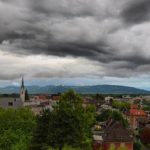Architektur | Kultur
Vorarlberger Hof EN
-
When the Association for the Education of Workers openly subscribed to social democracy a couple of years after its founding in Dornbirn in 1873, it was banned. Initially, the Social Democratic Party had little success in Dornbirn, the majority of workers voted generally for the conservatives. Certainly one of the main reasons lay in the conception of social democrats as foreigners, as people from outside Vorarlberg.
The first word the historian Reinhard Mittersteiner associates with the social democratic workers movement is “fremdhäßig”, an outdated term which translates to ‘someone with strange or foreign clothes’, in other words an immigrant.Quote 1:
From the 1893 “Landboten für Vorarlberg“ – a newspaper which no longer exists:
“Well, dear little lady, the ‘Sozi‘ – or Social Democrats – are usually young little boys without moustaches, … and by their place of birth, most of them are ‘Fremdhäßige’, that is they were born outside of Vorarlberg and they are employed here and were intentionally sent here to convert our homeland Vorarlberg to social democracy. … Fine boys, are they not?”
Indeed, most of the party’s supporters were families of immigrant craftsmen and laborers. Around 1900, the social democrats in Dornbirn wore black floppy hats decorated with a red feathers, as did the vagabond craftsmen. In 1898 the “Società Italiana dei Lavoratori e Lavoratrici” was founded, which was a separate workers‘ association for Italian immigrants. Johann Coufal (1847-1898) from Moravia, and Ignaz Leimgruber. played a crucial role in its founding.
Dornbirn became the administrative center of the socialists in Vorarlberg. In 1919 the “Arbeiterheim”, or so-called workers‘ home, was built, and later it became the “Vorarlberger Hof” tavern.
The following excerpt from the newspaper “Vorarlberger Volksblatt”, from 1897, reveals why running a tavern was significant:
“A tavern like “Mohren”, which is said to be one of our town’s finest, is about to become the permanent shelter of the red (social democratic) rascals, and if one observes those drunken young boys and their brazen behavior and their female comrades, and if one listens to their speeches that defile all that is holy to man, one must wonder how a landlord can make such a nice hall available again and again to this riffraff, only to sell a couple of hundred liters more beer. Have the people of “Mohren” lost all memory of the reputation this house used to have, have they lost all reverence for past times and the customers that used to gather there?Sources
The Social Democrats
When the Association for the Education of Workers openly subscribed to social democracy a couple of years after its founding in Dornbirn in 1873, it was banned. Although the authorities soon lifted the ban, its chairman Johann Georg Luger continued to be watched over. Luger was one of the craftsmen who represented a large portion of the Social Democrats in Dornbirn. Initially, the Social Democratic Party was unsuccessful. The Trade Association, which was founded in 1894, started with more than 140 members and remained larger than the Social Democratic Party for a long time. When the May First celebrations were held for the first time in 1890, only about 150 people participated. In 1895 the school headmaster Josef Gaßner founded the first Agricultural Association. In contrast to the Social Democratic Party, the association, which was converted into a co-operative society in 1899, became a highly successful institution.
Dornbirn became the administrative center of the Socialists in Vorarlberg, which can be credited to the work of Johann Coufal (1847-1898) and Ignaz Leimgruber. The carpenter Coufal, from Moravia, became acquainted with social democratic ideas in Switzerland. He died of tuberculosis at the age of 51, and after his death the party’s influence temporarily declined.
Initially, the Social Democratic Party had little success in Dornbirn, the majority of workers voted for the conservatives. Certainly one of the main reasons lay in the conception of social democrats as foreigners, as people from outside Vorarlberg. Tavern landlords who cooperated with the socialists were often put under pressure. For example, the landlord of the renowned “Mohren” tavern experienced this first-hand when she made her premises available to the social democrats for May celebrations and assemblies. In 1897 the newspaper “Volksblatt” wrote that the tavern “Mohren” was “about to become the permanent shelter of the red rascals”.
After World War I, when universal, equal, secret and direct suffrage was introduced, the Christian Social Party received 22, the Social Democratic Party 5 and the German Free-Minded Party 2 mandates in the local council. The Association of Farmers were allowed to send one delegate.Präsentiert von: Amt der Vorarlberger Landesregierung - Kultur
Autor: Stadtarchiv Dornbirn -
Anfahrt:
Anfahrtsplaner -



